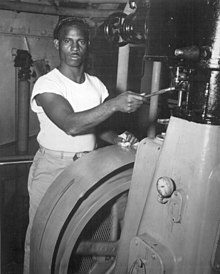This article needs additional citations for verification. (July 2010) |

An oiler (also known as a "greaser") is a worker whose main job is to oil machinery. In previous eras there were oiler positions in various industries, including maritime work (naval and commercial), railroading, steelmaking, and mining. Today most such positions have been eliminated through technological change; lubrication tends to require less human intervention, so that workers seldom have oiling as a principal duty. In the days of ubiquitous plain bearings, oiling was often a job description in and of itself.
Today, shipping is the economic segment that most thoroughly retains the notion of the oiler as a separate position. On a merchant ship, an oiler is an unlicensed rate of the engineering department. The position is of the junior rate in the engine room of a ship. The oiler is senior only to a wiper. Once a sufficient amount of sea time is acquired, the Oiler can apply to take a series of courses/examinations to become certified as an engineer.
As a member of the engineering department, the oiler operates and maintains the propulsion and other systems on board the vessel. Oilers also deal with the "hotel" facilities on board, notably the sewage, lighting, air conditioning, and water systems. They assist bulk fuel transfers and require training in firefighting and first aid. Moreover, oilers help facilitate operation of the ship's boats and other nautical tasks – especially with cargo loading/discharging gear and safety systems. However, the specific cargo discharge function remains the responsibility of deck officers and deck workers.